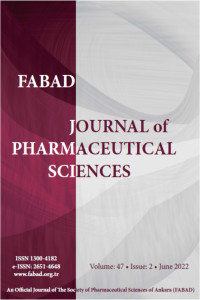Öz
Kaynakça
- Abuelsaad, A. S., Mohamed, I., Allam, G., Al-Solumani, A. A. (2013). Antimicrobial and immunomodulating activities of hesperidin and ellagic acid against diarrheic Aeromonas hydrophila in a murine model. Life Sci, 93, 714-722.
Studying the Protective Effect of Ellagic Acid Against High Glucose-Associated Toxicity in H9C2 Cardiomyocytes
Öz
Diabetes mellitus leads to an increased risk factor for cardiovascular
diseases. Accumulating evidence has demonstrated that high glucose
(HG) can promote massive apoptosis in cardiomyocytes. Oxidative
stress has been known as main factor responsible for HG-induced
apoptosis. Ellagic acid, a natural phenolic compound, exhibits
anti-inflammatory, anti-atherogenic, and antioxidant effects.
This study was carried out to evaluate the effects of ellagic acid on
HG-induced oxidative damage in H9C2 cells. The effect of ellagic
acid on the viability of cells was evaluated by the MTT method.
The oxidative stress parameters, including levels of malondialdehyde
(MDA), glutathione (GSH), total antioxidant capacity (TAC), and
superoxide dismutase (SOD) activity were also measured. The results
indicated that ellagic acid (10 μM and 20 μM) could remarkably
enhance the cell viability of H9C2 cells exposed to HG. In addition,
ellagic acid significantly improved the levels of intracellular GSH,
TAC, and SOD, whereas the levels of MDA were attenuated. These
results revealed a protective effect of ellagic acid on HG-induced
cytotoxicity, at least partially, by increasing antioxidant activity and
preventing oxidative stress.
Anahtar Kelimeler
H9C2 cells high glucose ellagic acid cardiotoxicity oxidative stress
Kaynakça
- Abuelsaad, A. S., Mohamed, I., Allam, G., Al-Solumani, A. A. (2013). Antimicrobial and immunomodulating activities of hesperidin and ellagic acid against diarrheic Aeromonas hydrophila in a murine model. Life Sci, 93, 714-722.
Ayrıntılar
| Birincil Dil | İngilizce |
|---|---|
| Konular | Eczacılık ve İlaç Bilimleri |
| Bölüm | Araştırma Makalesi |
| Yazarlar | |
| Yayımlanma Tarihi | 1 Ağustos 2022 |
| Gönderilme Tarihi | 2 Eylül 2021 |
| Yayımlandığı Sayı | Yıl 2022 Cilt: 47 Sayı: 2 |

